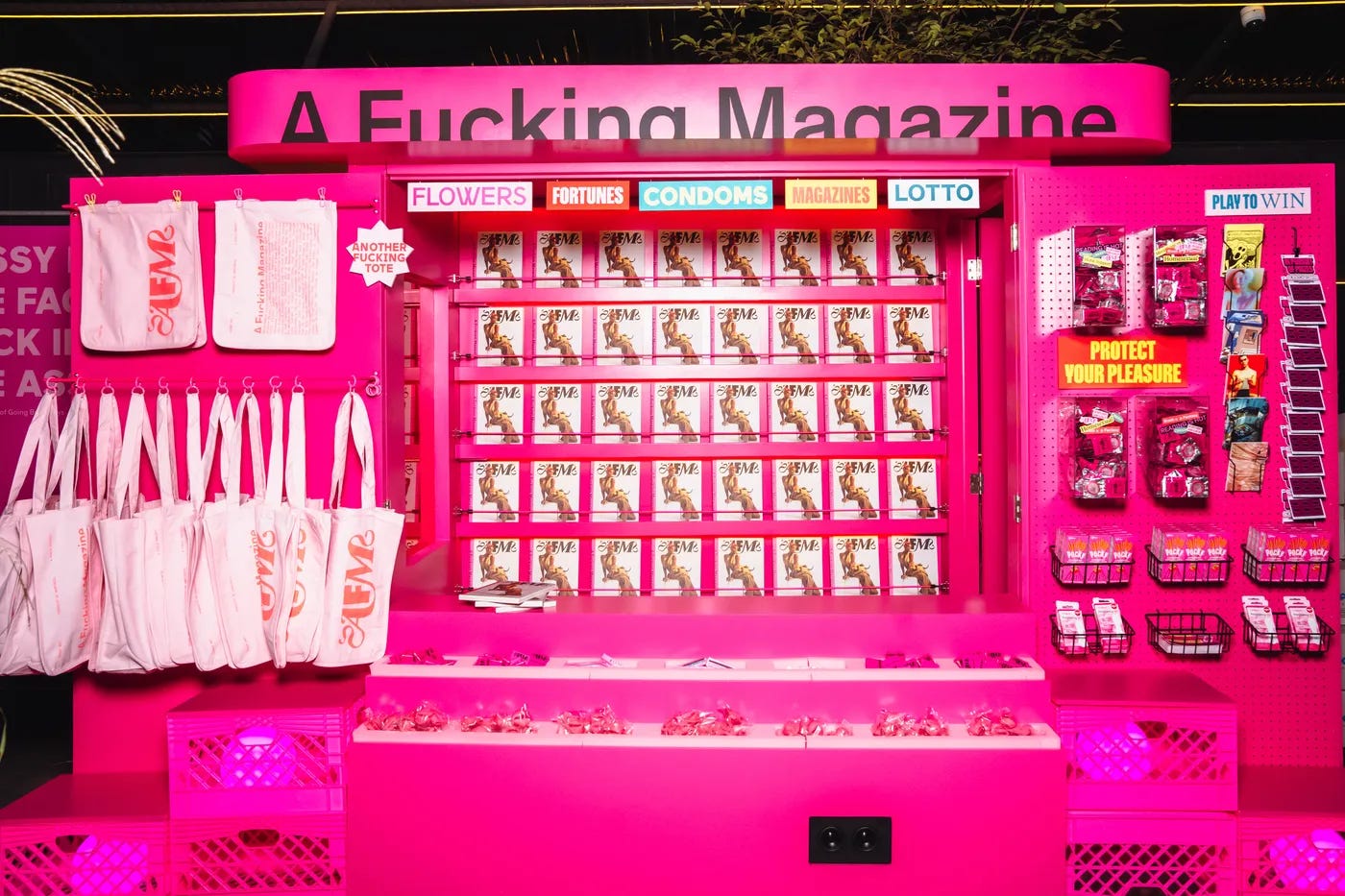A Masterclass in Branding: Turning a Kink-Friendly Dating App into a Sophisticated Brand
Lessons from Feeld's Cultural and Intellectual Rebrand
The current dating app scene is grim, to say the least. Users are so dissatisfied with Hinge, Bumble and Raya that they’re joining running clubs in an attempt to find courtship. People seeking committed relationships, sexual adventures, or a mix of both are left navigating mismatched expectations, unmet needs, and a lack of trust.
Enter London-based Feeld, which has helping facilitate threesomes for over a decade. In a crowded and uninspired market, Feeld has emerged as the premier destination for the sexually curious—those looking to explore a spectrum of relationships, from kink and polyamory to celibacy. Some say it’s even gone mainstream. The numbers support this: with over 30% year-over-year growth, Feeld's revenue nearly doubled in 2023, jumping from $26 million to $49 million, while profits climbed from $3 million to $6.9 million.
I first heard of Feeld over martinis with a friend from Google who described the app’s unique appeal and cultural dynamics surrounding it, including the origin of terms like “brat” in BDSM communities. It was clear to me that Feeld had tapped into a growing cultural movement—one that celebrates inclusivity, queerness, and exploration beyond conventional boundaries.


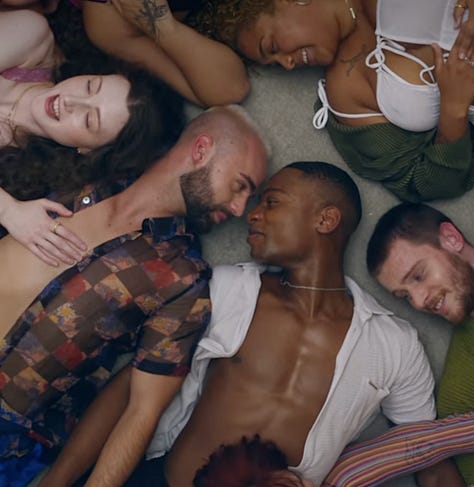
This surge in popularity reflects a broader trend: the rising interest in subcultures and niche communities, particularly among Gen Z, who are reportedly the queerest generation yet. By positioning itself as a sophisticated platform for the curious, Feeld has made a savvy business move that strengthens its community and elevates its brand identity.
In a bid to solidify this elevated positioning, Feeld launched AFM- short for A Fucking Magazine, a literary publication that positions the brand as a sophisticated space for the intellectually, culturally and sexually curious. While other dating apps, like Hinge have experimented with zines, Feeld has done it in a way that truly resonates with, and elevates it’s community. How did Feeld stick the landing so hard? Maria Dimitrova and Haley Mlotek, the co-editors of the magazine sourced many of the essays from open submissions that Feeld users shared themselves, including “Self Portrait as the Tree of Knowledge (a.k.a. Trans Poetica),” by Delilah McCrea.
Feeld went hard on this drop. AFM is filled with wildly diverse voices from respected established and emerging writers, adding credibility, sophistication and intellectual weight to the brand’s image. 96 year-old director James Ivory wrote an essay about coming out during World War II. Tony Tulathimutte, author of this fall’s hit Rejection, which Vogue called ‘The Best New Book about Modern Life’ contributed an essay called “Creeps”, and Allison P. Davis, who wrote The Cut’s recent polycule cover story co-authored a piece on desire and its expression through language with Susanna Moore. Hera Lindsey Bird contributed an Abandoned Love Poem. An interview with Bruce LaBruce, the provocative filmmaker and photographer further set the tone for intellectual and cultural exploration amongst avant-garde perspectives.
Perhaps the most heart-wrenching piece—and the one that moved me to tears this morning—was Merritt Tierce’s essay on her struggles to produce a TV show about abortion. “The executive vice president of television said, ‘Well, abortion anthology is not one but two words no studio wants to hear.’” I found myself falling a little more in love with Feeld for being ‘brave enough to let these stories be told’, when Netflix would not.
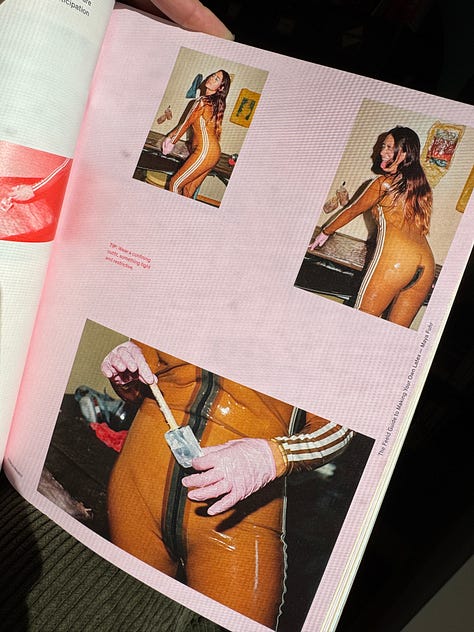


The cover is graced with multidisciplinary artist, DJ and writer Juliana Huxtable, who’s work explores themes of identity, technology and the body. Her presence on the magazine’s first issue sets a powerful and avant-garde done for the publication’s progressive and inclusive brand identity. “I want to impart a sense of freedom, where we’re all, for a moment, free together” she says, making me ache to join her journey on the dance floor.
The magazine launched with an intimate event with New York’s literary elite. Chronicled in the New York Times, the evening was hosted at the Upper East Side book-filled home of the renowned author and critic Daphne Merkin, who’s infamous 1996 spanking essay shot her into the literary elite. If you haven’t read it yet, here’s an excerpt to peak your curiosity:
“This scenario, in which my normally alert self was reduced to a condition of wordless compliance via a specific ritual of chastisement, exerted a grip that was the more strong because I felt it to be so at odds with the intellectually weighty, morally upright part of me.”- Unlikely Obsession, 1996
The event was a successfully strategic move to associate Feeld with New York's literary elite. They tastefully brought together the literary old guard, including “Sex and the City” author Candace Bushnel, Molly Jong-Fast, and rising literary stars like novelist Emma Cline, alongside Kiara Barrow and Rebecca Panovka, co-founders of the hit lit mag The Drift.

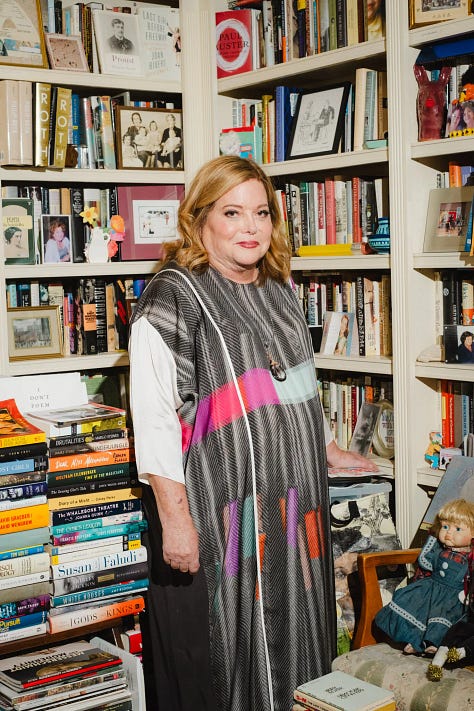
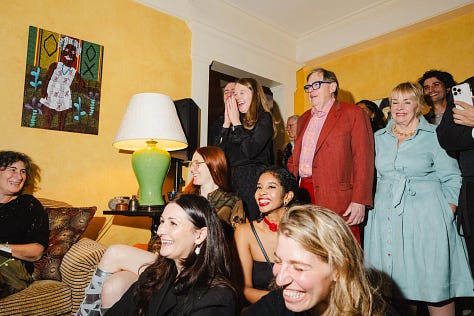
The following night, the magazine met it’s community in a darker, edgier corner of the city, where cover star Juliana Huxtable DJ’d at Public Records in Gowanus. This appeared to be much more of a classic brand community activation, complete with totes, pregnancy tests, and condoms, amongst the backdrop moments that begged to be captured for social, like a giant neon pink sign reading “PUSSY IN THE FACE, COCK IN THE ASS”. But it did what it was meant to do; make the brand look cool, and get people talking about it.
And for those that missed the parties and haven’t picked up the magazine, the captivatingly erotic artist and author Sam Morris is waiting in your feed, (mostly) naked, urging you to “Go read a fucking magazine.”
It’s been a while since I’ve been captivated by a brand re-positioning like this. By creating a high-quality print publication with elite taste communities, Feeld was able to effectively reposition itself as a sophisticated brand that appeals to intellectuals and creatives, moving beyond its original identity as merely a dating app for alternative relationships.
Feeld has bridged the gap between its fringe, tech-oriented roots and the cultural elite in a way no dating- or even tech app has done before. Through AFM, Feeld has effectively repositioned itself as a sophisticated brand that appeals to intellectuals and creatives, moving beyond its initial identity as merely a dating app for alternative relationships. Wanna do it too?
Feeld Lessons: Key Takeaways for Brand Marketers
Co-create with your community
In the opening letter, the editors write “We may have been the ones to make this thing, but now it’s your fucking thing.” Collaborate with your audience by inviting them to contribute content, ideas, and cultural creations. This creates a brand that is genuinely inclusive and authentic, and builds a community where users feel ownership and connection.
Elevate niche subcultures with cultural sophistication
Position niche interests or subcultures within a refined, culturally aware framework. By treating alternative or underrepresented communities with respect and intellectual depth, you can create a brand that resonates on a meaningful level.
Create high-quality cultural artifacts
Develop content, physical artifacts, moments and experiences that act as cultural touch points. These artifacts serve as lasting symbols of your brand’s values and commitment to cultural engagement, and will act as content-producing signals both online and off.
Partner with Diverse, Respected Creators to build Depth and Credibility
Collaborate a tasteful variety of established and emerging creators who bring credibility, cultural relevance and fresh perspectives. Be strategic and thoughtful; it’s abundantly obvious and unsettling when brands get lazy ticking diversity boxes.
Tailor strategies and messages for your core communities
Engaging with subcultures is highly effective because it targets niche, specific interests. This requires tailored yet cohesive strategies for each audience, addressing their unique identities and passions. This will allow you to connect on a much deeper, more human level and allow your brand’s multifaceted personality to drive loyalty among diverse, yet interconnected, communities.
I hope that this inspires you to make something bold, beautiful and thought-provoking. I hope that you feel a sense of urgency, and opportunity to support and empower your communities, recognizing the creative and cultural value they bring. I hope that you never forget that you have the power to share the stories that need to be told. And, I hope that you’ll support NYC’s Casa Magazines by picking up a copy or ordering one online to experience the magic for yourself ✨
As always, I’m very much interesting in hearing your thoughts, your questions, your ideas.





